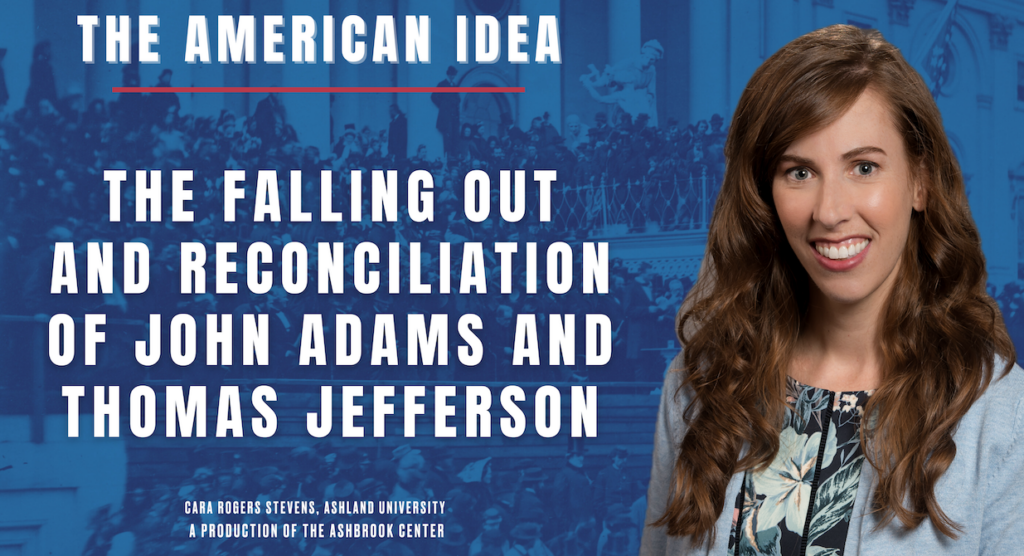The Falling Out and Reconciliation of John Adams and Thomas Jefferson
January 22, 2025

Listen and subscribe to the podcast
Join The American Idea’s Listener Email list – get news about upcoming episodes and a chance to offer questions for them, too!
The Bitter Election of 1800: A Nation Divided
The election of 1800 stands as one of the most tumultuous and divisive moments in American political history. At its heart were Thomas Jefferson and John Adams, two titans of the Revolutionary era whose philosophies and visions for the young nation diverged sharply. This contest marked the emergence of political parties—the Federalists and the Democratic-Republicans—and with them, a level of vitriol and partisan rancor that seemed to threaten the very foundation of the republic.
The campaign was rife with accusations and fearmongering. Federalists painted Jefferson as a radical who would upend the social order, while Democratic-Republicans accused Adams of aspiring to monarchical power. The public discourse, amplified by a nascent but vigorous press, fostered a climate of uncertainty and distrust. By the time Jefferson emerged victorious, the nation was not merely politically divided but deeply fractured, with many questioning whether unity could be restored.
Jefferson’s Inaugural Address: A Balm for Division
On March 4, 1801, Thomas Jefferson addressed the nation as its third president, delivering an inaugural speech that sought to mend the wounds inflicted by the contentious election. Jefferson recognized the bitterness of the campaign but refused to dwell on it. Instead, he offered a vision of reconciliation and unity, grounding his appeal in the enduring principles of the Constitution.
“We are all Republicans, we are all Federalists,” Jefferson declared, in a statement that has resonated across centuries. With these words, he acknowledged the legitimacy of political differences while emphasizing the shared values that bound the nation together: liberty, equality, and the pursuit of a government by and for the people. Jefferson understood that democracy’s strength lay not in unanimity but in the ability to navigate and respect diversity of thought.
Jefferson’s speech also underscored his faith in the resilience of democratic institutions and the essential role of free speech. “Error of opinion may be tolerated where reason is left free to combat it,” he proclaimed, articulating a belief that open debate and the free exchange of ideas would ultimately guide the nation toward truth and justice. It was a hopeful, almost idealistic, message, designed to remind citizens that their allegiance to the republic’s principles should transcend temporary political divisions.
The Path to Reconciliation: Jefferson and Adams Reunited
The personal relationship between Jefferson and Adams, once marked by camaraderie during the Revolution, had soured under the weight of political rivalry. Their ideological differences had become deeply personal, exacerbated by the brutal campaign of 1800. For years after the election, the two men remained estranged, each nursing wounds inflicted by the other’s words and actions.
The reconciliation between Jefferson and Adams, however, is a testament to the power of dialogue and mutual respect. The physician and mutual friend Benjamin Rush played a pivotal role in bringing the two former friends back together. Encouraged by Rush, Jefferson and Adams began corresponding in 1812, initiating a remarkable exchange of letters that spanned 14 years and addressed topics ranging from politics and philosophy to their reflections on aging and legacy.
Through this correspondence, Jefferson and Adams confronted their differences—both political and personal—with candor and a shared commitment to understanding. They acknowledged past grievances but chose to focus on the common ground forged during their revolutionary efforts. The letters revealed a deepening mutual respect, as each man recognized the other’s contributions to the American experiment and their shared vision of its future. Their dialogue not only healed their fractured friendship but also provided a powerful example of reconciliation for a divided nation.
Enduring Lessons in Unity and Dialogue
The story of Jefferson’s first inaugural address and his reconciliation with Adams offers enduring insights for navigating partisan division. Jefferson’s acknowledgment of shared principles, his call to protect minority rights, and his belief in the transformative power of free speech remain as relevant today as they were in 1801. Similarly, the rekindling of his friendship with Adams underscores the importance of dialogue, humility, and the willingness to engage with those who hold opposing views.
In an age where political polarization often seems insurmountable, Jefferson and Adams’ journey from rivalry to reconciliation serves as a poignant reminder that even the deepest divisions can be bridged. It challenges us to seek common ground, to prioritize the principles that unite over the differences that divide, and to remember that the health of a democracy depends not on the absence of conflict but on the presence of respect and reasoned discourse.
As we reflect on the example set by these two towering figures of American history, we are reminded that reconciliation is not merely an act of personal grace but a civic duty—one that has the power to strengthen the bonds of a nation and ensure its continued resilience.

